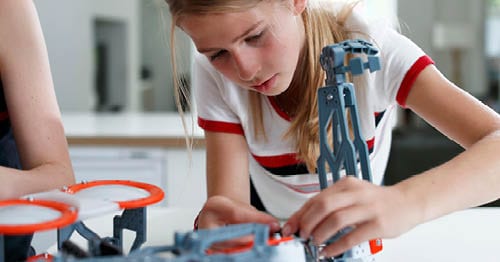Preparing Students for the Workforce While Still in High School
byConnections Academy
6 min to read
It can be hard to help kids see why it is important to prepare for the future, especially for students who are still in high school. Since preparing students for the workforce can begin at any time during their time in school—and in some cases, the sooner the better—there are simple things they can focus on to help them be ready for any career they choose.
Why It’s Critical to Prepare Students for the Future of Work
By preparing students for the modern workforce while they are still in school, teenagers can graduate with less anxiety about their abilities to find employment. When students feel anxious, their thoughts can be stuck ruminating on the future instead of presently focused on what is going on today, which can lead to students feeling overwhelmed, frozen, or hopeless.
While no one can know exactly what kind of jobs the future holds, there are some universal skills and qualities students can develop during their high school years that can help give them an advantage once they are ready to enter the job market.

4 Essential Skills That Can Prepare High Schoolers for Any Job
1. Complex Problem-Solving
Complex problem-solving skills allow people to think independently, anticipate roadblocks before they happen, and come up with solutions on their own.
Rather than letting their teachers or parents handle everything for them, high school students should be allowed the time and space to find their own solutions for complex problems. Completing challenging homework assignments on their own can be a safe way to explore complex problem-solving, but families should also leave room for teens to identify and suggest solutions for other complicated aspects of their lives.
For example:
Planning enough time in their schedule to do both extracurricular activities and studying or homework
Keeping track of their own grades and assignments and identifying if they need additional help
Looking back on their past experiences and learning from what worked and what didn’t
2. Critical Thinking
Being able to think critically allows students to differentiate between credible and noncredible sources and analyze information for bias or inaccuracy.
Students often exercise their critical thinking skills in school while working on research papers or while analyzing text in their English or History classes, but students can also develop their critical thinking skills outside of the classroom by:
Looking at information from multiple sources rather than trusting a single person’s opinion
Challenging their preconceptions by asking themselves why they think what they think
Playing strategy games that rely on pattern recognition or logical processing
3. Collaboration
Collaboration skills allow students to not just get along with one another but to embrace each other’s points of view and allow someone else’s strengths to complement their own as they work on a single project. Collaboration happens naturally during the school day through group projects or on sports teams, but students can also develop their collaboration skills by:
Improving their listening skills and asking others productive questions when working together
Fully understanding someone else’s perspective or ideas, even if they don’t agree
Finding opportunities to compromise or discover common ground
4. Reliability
Students learning to be reliable helps others be able to trust them at their word. Reliable people are able to hold themselves accountable, deliver timely and consistent work, and are someone others can trust. In school, reliability is practiced mainly through completing assignments on time, but students can also improve their skills by:
Making commitments and sticking to them through self-discipline
Practicing time management skills by prioritizing important tasks and saying no to other opportunities when they need to
Keeping their learning space and materials organized so they can be prepared to learn rather than getting distracted or sidetracked
Encourage Career Exploration in High School
While there are students prepared for the workforce, deciding what career to pursue after graduation is not as straightforward as learning career readiness skills.
However, high schoolers can explore career options while still in high school by:
Job shadowing people in careers they are interested in for a short period to see what working in that career is really like
Taking a career quiz to learn what sorts of careers they find interesting
Reaching out to mentors such as teachers, coaches, school counselors, family, friends, and other adults in their lives to learn more about different careers or job opportunities they might be suited for
Sign up for clubs or volunteer opportunities that allow students to explore new interests and develop key workplace skills
How Can Schools Better Prepare Students for the Workforce?
Schools themselves can be one of the easiest ways for students to prepare for the future workforce. People like school counselors, teachers, club leaders, or other faculty have access to several resources that can help students better understand the nature of work and build their career readiness skills, such as:
Hosting job fairs where students can connect to local businesses and learn more about open job opportunities
Offering digital certifications through programs like Coursera or Credly to help students develop real-world, marketable skills
Creating and refining resumes so students can apply for college scholarships, internships, or jobs
Connecting students to hands-on learning opportunities through apprenticeship programs like Path to Pro
How Online School Helps Students Balance Work and Education
Flexibility. Online high schools like Connections Academy offer flexible scheduling options that allow students to have more control over when they attend class during the day, where they study, and how they would like to organize their learning space. With more flexibility, students can take time during the day to job shadow or focus on career-building tasks like volunteering or pursing extracurricular activities.
Self-Paced Curriculum. Students in online high school often have more control over their learning than students in brick-and-mortar schools. Through a combination of recorded and live lessons with their teachers, students can learn how to better manage their time and learn how to keep themselves motivated throughout the day.
Access to Opportunities. Without the physical limitations of a brick-and-mortar school, online high school students can access a wider selection of opportunities to develop their career readiness skills, such as enrolling in career and technical education tracks, dual enrollment or other college credit courses, and clubs or organizations such as HOSA or Future Business Leaders of America.
Build Career Readiness Skills with Online School
When it comes to preparing students for the future of work, online schools such as Connections Academy may prove to be a helpful solution. At Connections Academy, we prepare students by helping them find direction in their career search, develop skills, and make connections so they can feel confident about their future. Our students get exposure to real-world experiences with our industry partners, and we connect students to experiences, opportunities, organizations, businesses, and people who can help them turn their future into one they are excited by.
Learn more about how Connections Academy can help prepare students for the jobs of the future by exploring our College and Career Readiness programs or reach out to an enrollment specialist to discover if online school is the right fit for your family.
